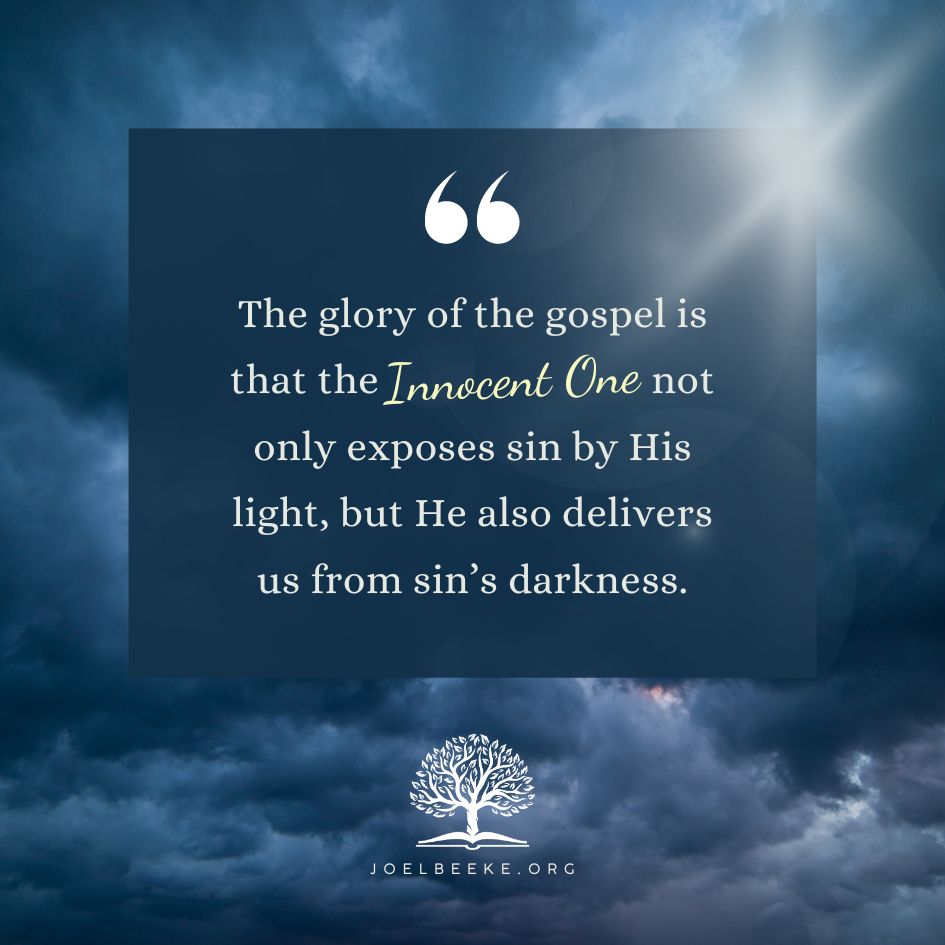
I am come a light into the world, that whosoever believeth on me should not abide in darkness. — JOHN 12:46
If I had not come and spoken unto them, they had not had sin: but now they have no cloak for their sin. — JOHN 15:22
Bright light is a mixed blessing. While it frees us from the oppression of darkness, it also reveals the ugly flaws and imperfections that previously lay hidden in the shadows. As the light of the world, Christ reveals the rottenness of sin (John 9:5). Since the fall in Adam, God had sent prophets to expose people’s sin, call them to repentance, and point them to Christ (Jer. 25:3–7). Nonetheless, sin’s ghastliness was not made fully manifest until Christ came to earth (Acts 17:30; cf. Luke 12:48). Because they were sinners, none of God’s earlier messengers had personally embodied the stark contrast between God’s holiness and man’s sinfulness. In Christ’s suffering, particularly in the crucifixion, the darkest blot was painted on the brightest canvas.
Christ came as the brightness of God’s glory, in true and complete innocence, to reveal the abominable character of sin (Heb. 1:3; cf. Ezek. 8:3–4). We often describe babies or young children as innocent, but in Psalm 51:5, the psalmist confesses, “Behold, I was shapen in iniquity; and in sin did my mother conceive me.” Christ alone entered the world innocent. The Gospels highlight Jesus’ innocence, particularly in the hours preceding His death. The Sanhedrin struggled in vain to find sufficient false witnesses to agree on a charge to lay against Him (Matt. 26:60). When the crowd demanded that Jesus be crucified, Pilate asked, “Why, what evil hath he done?” (Matt. 27:23). In the span of nine verses, John records Pilate saying three times that he can find no fault in Christ (John 18:38–19:6). The centurion in command of the soldiers who were to carry out Pilate’s death sentence confirmed Christ’s innocence, saying, “Certainly this was a righteous man” (Luke 23:47). Even creation revolted at the Innocent’s unjust death; Matthew 27:51 says, “The earth did quake, and the rocks rent.”
Christ came as the brightness of God’s glory to reveal the abominable character of sin (Heb. 1:3; cf. Ezek. 8:3–4). The glory of the gospel is that the Innocent One not only exposes sin by His light, but He also delivers us from sin’s darkness.
The world into which Jesus came, ruled by pagan Rome, lay in darkness. Even among God’s people were few who practiced true religion. Many of the religious leaders had become blind guides (Matt. 23:24). True religion was like a single, flickering candle set against the dark, howling night. Seven hundred years before Christ’s birth, Isaiah had said, “The people that walked in darkness have seen a great light: they that dwell in the land of the shadow of death, upon them hath the light shined” (9:2; cf. Luke 1:79).
Fittingly, the birth of Christ was heralded by the shining of bright light in a dark world. Suddenly, in the dark of night, the angel of the Lord stood before the shepherds, “and the glory of the Lord shone round about them” (Luke 2:9). Later, a bright star directed the Magi to Jesus (Matt. 2:1–12). A still more glorious light accompanied Jesus’ life and ministry. The apostle John recalls beholding the glory of the Word made flesh (John 1:14). Jesus, the Light of the World, promised, “He that followeth me shall not walk in darkness, but shall have the light of life” (John 8:12). Shortly before His death Jesus said, “A little while is the light with you…. While ye have light, believe in the light, that ye may be the children of light” (John 12:35–36). When that light was lifted up at Golgotha, both the justice and redeeming love of God shone with burning brightness (cf. John 12:32).
We take light for granted until we are without it. The last time you tried to find your way in the darkness, you probably held your arms out as you groped for something firm. God is not far from any of us. The problem is simply that until He opens our eyes, we can’t see Him but are left to “feel after Him” in the darkness (Acts 17:27). We can’t make sense of our lives until “God, who commanded the light to shine out of darkness, hath shined in our hearts, to give the light of the knowledge of the glory of God in the face of Jesus Christ” (2 Cor. 4:6). As the pillar of fire who led His people through the wilderness (Ex. 13:21; 14:20), the Lord Jesus Christ has called out of darkness and into His marvelous light a “chosen generation, a royal priesthood, an holy nation, a peculiar people,” to show forth His praises (1 Peter 2:9). Calvin says, “If the whole wisdom of the world were collected into one mass, not a single ray of the true light would be found in that vast heap; but, on the contrary, it will be found a confused chaos; for it belongs to Christ alone to deliver us from darkness.”1Calvin, commentary on John 12:47.
Excerpt from
Why Christ Came: 31 Meditations on the Incarnation
By Joel R. Beeke and William Boekestein








